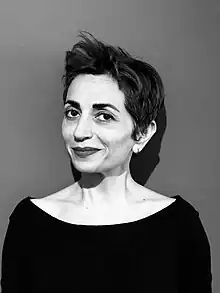Lina AbiRafeh | |
|---|---|
 | |
| Academic background | |
| Alma mater | Johns Hopkins University (Master's) London School of Economics (Ph.D) |
| Thesis | Afghanistan gozargah: Discourses on gender-focused aid in the aftermath of conflict (2008) |
Lina AbiRafeh is an Arab-American feminist activist and author who works gender issues in development and humanitarian contexts. She has worked for various United Nations agencies and international non-governmental organizations and was the executive director of the Arab Institute for Women at the Lebanese American University.
She is the author of Gender and International Aid in Afghanistan.
Early life and education
AbiRafeh was born to a Palestinian pharmacist mother and a Lebanese father and spent time in Saudi Arabia while growing up.[1][2]
AbiRafeh has a master's degree in international economics and development from the Johns Hopkins University.[3]
She completed her PhD at the London School of Economics and Political Science in 2008, her thesis focusing on gender based violence in humanitarian aid in conflict and post-conflict zones.[3]
Career
AbiRafeh has worked with various United Nations and humanitarian organizations in Afghanistan, Central African Republic, the Democratic Republic of the Congo, Haiti, Lebanon, Nepal, and Papua New Guinea.[3] For seven years,[4] starting in 2015, she was the executive director of the Arab Institute for Women at the Lebanese American University.[5]
She has critiqued western obsession with how Afghan women dress.[6][7] She has also critiqued the humanitarian aid system for neglecting the needs of men and drawn links between that neglect and increased rates of gender based violence in Afghanistan.[8]
Awards
In 2019 she was identified by Apolitical Group as one of the top most influential people in gender equity policy.[9]
Selected publications
- Lina AbiRafeh, Gender and International Aid in Afghanistan: The Politics and Effects of Intervention, 2009. ISBN 978-0786445196[10][11][12]
- Lina AbiRafeh, Freedom on the Frontlines: Afghan Women and the Fallacy of Liberation, 2022, ISBN 978-1476689425
- Lina AbiRafeh, Lessons from Gender-focused International Aid in Post-Conflict Afghanistan...Learned?, 2005, ISBN 3-89892-413-0[13][14]
- Lina AbiRafeh, Freedom is Only Won From the Inside: Domestic Violence in Post-Conflict Afghanistan, 2006, The Peaceful Families Project[15][16]
References
- ↑ Anneau, Manon (2019-09-26). "Shape Your Future with Lina Abirafeh, Executive Director of the Arab Institute for Women". Impakter. Retrieved 2023-01-11.
- ↑ "NAYA| Lina Abirafeh: An influential researcher in gender policy". annahar.com. Retrieved 2023-01-11.
- 1 2 3 "Lina Abirafeh". The Conversation. Retrieved 2022-01-14.
- ↑ "Lina AbiRafeh, PhD - SheSource Expert - Women's Media Center". womensmediacenter.com. Retrieved 2022-12-31.
- ↑ "Lina AbiRafeh". Middle East Institute. Retrieved 2022-12-31.
- ↑ Sienkiewicz, M. (2016). The Other Air Force: U.S. Efforts to Reshape Middle Eastern Media Since 9/11. United States: Rutgers University Press.
- ↑ Precarious Creativity: Global Media, Local Labor. (2016). United States: University of California Press.
- ↑ Skaine, R. (2008). Women of Afghanistan in the post-Taliban era: how lives have changed and where they stand today. United Kingdom: McFarland, Incorporated, Publishers.
- ↑ "The World's 100 Most Influential People in Gender Policy". Apolitical. Retrieved 2022-01-14.
- ↑ Walter, B. (2017). Gendering Human Security in Afghanistan: In a Time of Western Intervention. United Kingdom: Taylor & Francis.
- ↑ Muslim Women in War and Crisis: Representation and Reality. (2010). United States: University of Texas Press.
- ↑ Smith, JuliaH. (Dec 2012). "BOOK REVIEW Gender and International Aid in Afghanistan: The Politics and Effects of Intervention" (PDF). Journal of Peace, Conflict & Development. 19.
- ↑ Hudson, Natalie Florea. Gender, human security and the United Nations: Security language as a political framework for women. Routledge, 2009.
- ↑ Brodsky, Anne E. "Multiple psychological senses of community in Afghan context: Exploring commitment and sacrifice in an underground resistance community." American Journal of Community Psychology 44.3 (2009): 176-187.
- ↑ True, Jacqui. The political economy of violence against women. Oxford University Press, 2012.
- ↑ Suhrke, Astri. "Reconstruction as modernisation: the ‘post-conflict’project in Afghanistan." Third World Quarterly 28.7 (2007): 1291-1308.